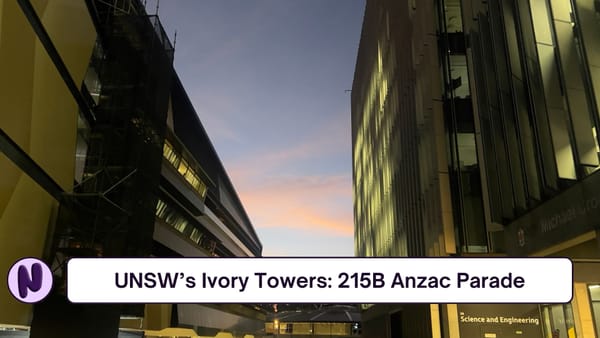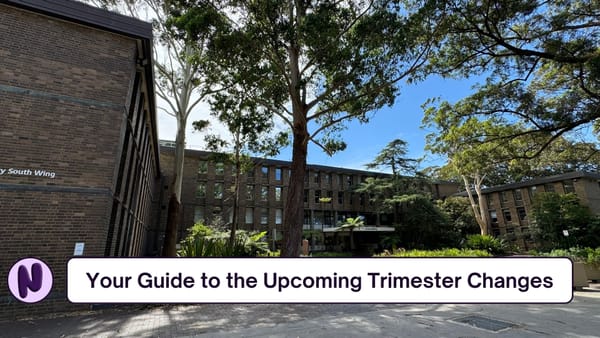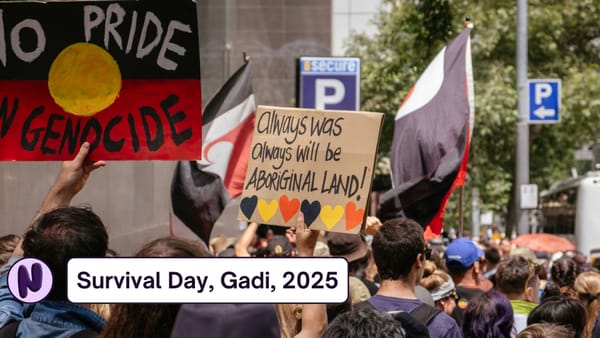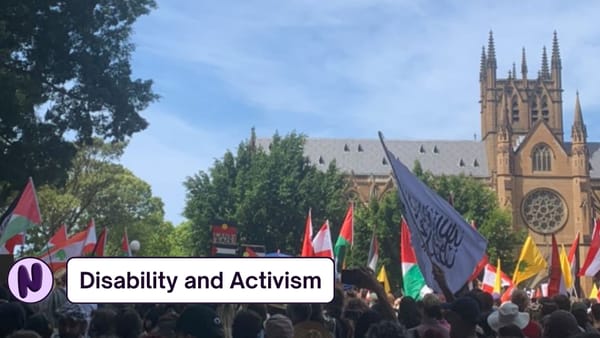How not to run an EGM: A case study of the Game Development Society
Joseph examines what went wrong at this trainwreck of a meeting.
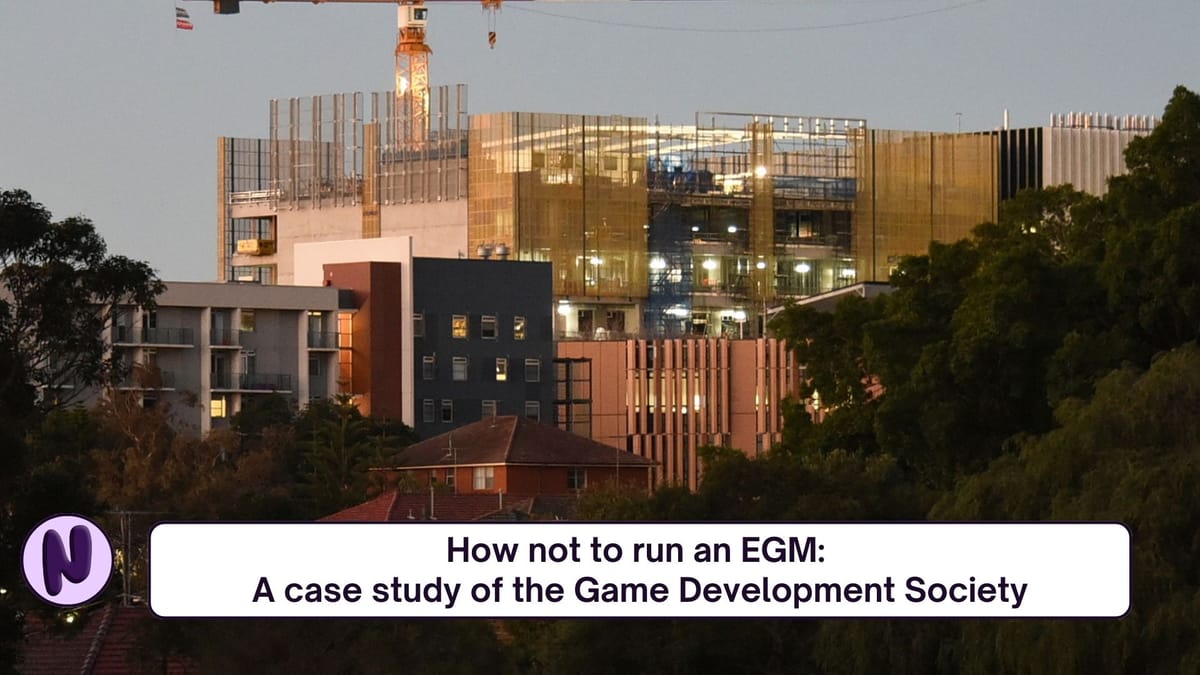
Game Development Society is an incorporated Arc-affiliated club at UNSW, and according to its website is ‘focused on teaching people how to make games.’ Their funding comes from a combination of grants from Arc, as well as funding directly from the School of Computer Science and Engineering. This funding has allowed it to attend major conferences such as PAX Australia and SXSW Sydney, amongst the regular weekly events they hold throughout the year.
While its aim is “to bring together students interested in creating any aspect of video games,” the club’s latest actions brought together students more interested in watching some drama unfold. If you’re looking for a rundown on the ‘tea’, you won’t find it here. That's because if you asked me, I don’t think I could even explain it to you - a testament to how incoherent this meeting was.
This article focuses on the procedural issues with the Game Development Society’s Extraordinary General Meeting as a lesson for executives of clubs and societies, whether based at UNSW, other universities and beyond.
Confusing messaging behind the meeting notice
GDS’s EGM was doomed from the beginning, starting from the moment it was announced.
On the 25th of October, an EGM was announced by the UNSW Game Development Society via email and Discord. This meeting was brought forward by a petition to the outgoing President to ‘ban’ two of GDS’s new incoming executives. The petition and who signed it was not attached to the meeting notice or Discord message. As the GDS constitution is not public, I couldn't confirm whether a ‘ban’ is an actual formal process for the society, but nothing of that phrasing is utilised in the Clubs model constitution nor the incorporated associations model constitution.
Join us… as we vote to ban [REDACTED 1] and [REDACTED 2] and vote to initiate a re-election… Evidence will be presented along with a 5-minute counter speech.
The petition accuses [REDACTED 1] of conducting criminal activities against the club and used threats, bullying, misuse of information, lies, and deceit to sabotage the club for his own personal gain.
An accusation of criminal activities for an EGM is highly inappropriate and a complete abuse of the EGM process. Clubs do not have any authority to determine whether a criminal offence has occurred. If you or your club ever suspects an executive or member of committing a criminal offence, you should be reporting them to the relevant authorities. An accusation of this nature has no place in a club’s general meeting and opens both individuals and the society to defamation litigation. At no point during the EGM was it indicated that any party had been reported to any legal body such as NSW Fair Trading. Simply put, banning someone for not just uncharged, but unreported conduct, is highly problematic.
The petition also accuses [REDACTED 2], a friend of [REDACTED 1], to assist in some of these activities and interrupt the AGM in Week 4 to support [REDACTED 1] running for president by preventing disclosure of evidence regarding his past actions and dishonestly presenting past events.
The issues with these accusations are pretty paramount - the question being how they amount to anything worth removing someone from a club over. Ultimately, the club’s members agreed that these were not a basis to ban anyone and opted not to ban [REDACTED 2] over these accusations.
Both [REDACTED 1] and [REDACTED 2] are accused to have a percieved (sic) conflict of interest with the club with the individuals set to become President and Treasurer of the club respectively for 2025.
A vote for a full re-election of the executive is requested by the petition as all incoming executives are existing friends of at least one other incoming executive which raises a percieved (sic) conflict of interest and concerns about accountability of each others' actions in practice.
Ignoring that every use of the word perceived in this notice is spelt incorrectly, there was no detail in the notice that explained this perceived conflict of interest aside from the implied ‘they were friends and supported each other’.
For reference, a perceived conflict of interest is when it might appear to others viewing your activities that your personal interests could affect your decisions or performance in your executive role. It is not correct to state that mere friendship is a perceived conflict of interest. If it were remotely true, nobody on a board would be able to be friends with each other. Clubs would simply cease to exist if the ‘no friend’ rule was allowed.
Even if there was a perceived conflict of interest here, this does not mean either are immediately incapable of performing their role. Typically, executives of incorporated associations are encouraged to declare conflicts of interest. This means, for example, should a club decision arise that benefits the Treasurer, the Treasurer would declare their conflict of interest and be forced to abstain on voting on the matter.
Utilising the perceived conflict of interest was a grossly incorrect ground to attempt to remove Redacted 1 and Redacted 2 from the club, alongside being a completely unfounded reason to re-elect the entire executive.
[REDACTED 2] has also declared intent to force a handover today to attempt entering as executive of the club today which is unconstitutional (Clause 7.5.2) without all current executive members attending.
Noting my lack of access to the constitution, while perhaps this constitutional provision was breached, I’d alternatively suggest that this provision’s existence may be unconscionable. In the worst case scenario, mandating the presence of all incumbent executive members at a handover creates the opportunity for rogue actors to withhold attendance with ill intent, thereby preventing all valid forms of a handover. Another case is if an executive is absent, or ‘ghosting’ - it would effectively make handover impossible. This provision creates the possibility for the incumbent team to make handover extremely difficult, if not impossible, as has been proven by this whole saga. GDS’s handover was successfully delayed long enough to overturn the election results.
More meeting notices??
Within an hour of this EGM announcement, an ‘emergency’ general meeting was announced. This time, it was by those whom the petition was against, [REDACTED 2] sending the notice on Discord and the club’s Grievance Officer allegedly sending the email.
In response to this announcement, GDS sent a follow up email announcement.
Please ignore the previous email regarding an "Emergency General Meeting" as it is not a valid general meeting type and is improperly formatted as a notice to any type of general meeting. This was submitted by the grievance officer… without the approval of the President nor the Secretary, which goes against the constitution as [the President] did not approve it and it was not petitioned. This also overlaps the time of the Extraordinary General Meeting which would suppress and prevent evidence from being shown off and revealed to expose the parties involved.
I don’t quite know what happened here, but between the multiple emails and confusion of the meeting types, the only one suffering were the inboxes of members. While procedurally, two meetings at once makes no sense, I fail to see how this would suppress or prevent any evidence from being shown.
A follow up email from the Game Development Society email stated:
This is a 3-hour+ event running through dinner time so we will be providing free pizza…
Interestingly, the President was already aware at this point that the meeting would run for over 3 hours.
For clarification, all accusations in the petition on REDACTED 1 and REDACTED 2 regard that their conducts potentially occurred. This should not be treated nor interpreted as claiming the conducts did occur.
This is a very clear walkback in an attempt to mitigate potential defamation allegations, however it seems like a very semantic point to argue “I wasn’t accusing them of doing something, I was accusing them of ‘potentially’ doing something.” I disagree that the word ‘potentially’ changes the nature of the allegations in any way.
This email nor the previous Extraordinary General Meeting email makes claims about the individuals' conducts, except for the attempt of a handover last Friday and friendship between executives.
Again, this is plainly untrue from the wording of the original meeting - ‘The petition accuses [REDACTED 1] of conducting criminal activities against the club and used threats…’. It is difficult to view this as anything other than a claim in the plain sense of the word.
…you will determine if the individual has a conflict of interest, conducted possibly criminal activities against the club, used threats, bullied, misused privileged information, lied, deceived, sabotaged, actions for personal gain at the club's detriment, and any other relevant issue.
The EGM notice’s follow up email is expressly informing members that when deciding to ban someone, they will specifically be determining whether those actions occurred or not (aside from the ‘possibility’ of criminal activities). As already noted, EGM’s are not a court. This is a highly problematic use of an EGM.
The day of reckoning
When the evening of the EGM arrived, one thing became apparent - the lack of time constraint for the presentation of evidence.
The outgoing President and host of the meeting had compiled a 130 page slideshow of the ‘evidence’ against [REDACTED 1] and [REDACTED 2]. It is important to note that only [REDACTED 2] was able to attend the meeting. [REDACTED 1] was prevented due to a confidential reason that was leaked later into the meeting.
Conveniently for both sides, a substantial portion of evidence occurred over phone conversations. I think everyone would have died with more hours worth of screenshots. References to phone conversations meant that the outgoing President could describe the contents of the conversation however he pleased, while [REDACTED 2] could argue the ‘no evidence’ point all night long. On reflection, perhaps this played a part in dragging out the meeting.
It was also made clear from the outset that the outgoing President did not want this EGM recorded. He reminded attendees multiple times about this. It was unclear if this was a direction from Arc. Members in the audience struggled with this rule. Because the slideshow was rushed through so quickly, the audience was not given the opportunity to thoroughly read through slides. As a result, screenshots of slides were posted in the chat regularly.
Following the meeting, the entire chat was purged from existence by the President. Members were upset with this as it meant those who were unable to attend the EGM now could never know what happened. The chat contained a lot of discourse which is now no longer accessible. In response to complaints about the deletion, the President stated he only deleted it because ‘someone’ told him to, and that it was too late to do anything about it now. The lack of recording and the removal of messages would make it more difficult for anybody to pursue a claim of defamation, as any case would now be heavily reliant on eye-witness (ear-witness?) testimony and the potential subpoena of Discord logs.
Due to the meeting being held as a Discord stage, the room was limited to 50 people for a portion of the meeting, directly restricting how many people could be in the audience at the time. Another feature of Discord stage feature is that audience members are directly precluded from being able to speak unless ‘invited’ by the host. This meant that interjections from online audience members was impossible, and the host could directly silence anyone invited to speak at any point in time. When this limit was eventually lifted, there were upwards of 60-70 people in the online audience. This increase in 10-20 people was definitely enough to sway the results of any votes that occurred.
Was someone developing a new Ace Attorney with this meeting?
While the outgoing President went through the slides, [REDACTED 2] would interject frequently to ‘counter’ the evidence. At times, these counters felt like a courtroom cross-examination, validly pointing out that the evidence was mere hearsay, he said-she said, or that the evidence simply did not exist. He may as well have yelled ‘objection!’. The reveal that [REDACTED 2] had a law student assisting him came as no surprise to me.
What was highly concerning was the complete ignorance to procedural fairness afforded to all parties. One side had an unlimited amount of time to present, while the other only had five minutes to respond. This was ‘balanced’ by that same side being able to interject as much as they wanted, leading to the meeting being filled with unnecessary squabbling. I have compared the meeting to a trial, but any judge would have thrown all the parties out of the courtroom if any behaved as the parties did here. Each side should have had equal opportunity to present their case WITHOUT interjections.
Another glaring procedural fairness issue was the fact that [REDACTED 1] and [REDACTED 2] had no knowledge of any of the evidence that was going to be presented against them prior to the meeting outside of the vague EGM announcement. In response to this, they tried to have the evidence suppressed via a motion, which was unsuccessful. The audience was there for the tea and they definitely got the whole pot.
There were numerous other technological issues with the meeting - for example, the hybrid nature of the meeting and that the two people yelling at each other were in the room together meant that audio was often difficult to hear. The President was almost always entirely audible, while the person arguing against him [REDACTED 2] was on multiple occasions muted from the online audience’s end. At one point this occurred DURING a right of reply speech. At other points, [REDACTED 2] was only able to be barely heard in the distance through the President’s microphone.
Amongst the audience, a key figure was present - a member of Arc Clubs staff, who sat through the entire five hour meeting in person. I have concerns for the mental wellbeing of any individual who had to sit through in the room and hope they got paid reasonable overtime given the meeting was run on a Friday night. At the same time, I fail to understand why they did not intervene at any point to make the meeting more fair. From an online attendee’s perspective, it was hard to gauge what their role was in the room as the impartial third party, other than perhaps deterring any physical altercations.
A most concerning aspect of the meeting was when one of the slides of evidence revealed an extremely confidential and sensitive matter to the audience of 50+ attendees. Even after it was noted as confidential and asked to be removed, the point appeared on the slide again multiple times.
Game over for GDS
The meeting concluded around 11pm - not because the conversation had exhausted or the meeting was finally at an end, but because security had forced the attendees in person to leave the classroom they were using. UNSW Security typically asks students to leave classrooms and other university spaces around this time. The timing of this was rather inconvenient considering they had just voted to re-elect the entire executive team. As a result, GDS currently has no incoming executives - continuing to be led by the no longer outgoing President.
Rather ironically following the meeting, the President made an additional comment in the chat because they ‘didn’t have time to say that’ regarding the evidence, which they were immediately called out on. They had five hours to mention this fact at some point and they somehow failed to do so. This comment marked the beginning of several petty squabbles across the following days of the meeting in the GDS Discord’s general chat.
Upon the meeting’s conclusion, it was suggested that GDS would be temporarily suspended as an affiliated Club with Arc. As an incorporated association, the exact implications of this remain unclear. A suspension should imply that the club would lose access to other benefits, such as room bookings and Arc grants. Despite this, the club is continuing to run as if this EGM never happened. Currently, at the time of publication the Club is still listed on the Arc Membership Portal and does not appear to have lost access to room bookings at this stage, even though they have zero 2025 Executives elected.
Conclusion - a critical hit to clubs
This general meeting was truly an appalling display of how NOT to run an EGM.
Watching the evidence unfold felt like scrolling through drama receipts in a group chat full of strangers. It was an uncomfortable trainwreck but you just couldn’t look away. There were absolutely some concerning issues raised in the evidence, but when trash talk from the multiplayer video game Valorant was alleged to be the original source of the conflict, I couldn’t help but wonder if these were grown adults in a professional society or infants on the playground.
It was clear to the audience that the conflict could have been resolved through an alternative dispute resolution practice instead of being hastily taken to an EGM. Ironically, the powerpoint slide alleging the root cause to be linked with Valorant stated “this should have been raised directly with [the Grievance Officer] as a personal grievance or with Arc instead of… all of this.” I was quite confused by this considering the one who wrote the slide is the one who brought the EGM and allegations to the public eye.
If this really needed to be brought to an EGM, there was a very clear way to do this. Arc would run the meeting, NOT the one bringing the petition and presenting the evidence. Then both sides get equally agreed upon time to present their case. Any extrinsic materials, such as a slideshow, must be shared with reasonable notice between the parties and not be altered before the meeting.
GDS has attempted to continue to function beyond the EGM, but the club’s subsequent actions seem to bring about further concerns. Firstly, no EGM has been announced as of yet to actually re-elect a new team, the outgoing President currently continuing his role indefinitely. Secondly, the EGM has been used as a marketing tactic for an upcoming event, announcing an ‘RGM’ (meant to be a ‘rat game making’ event). I was unimpressed when I saw that email; it felt insensitive to make light of the situation given that someone had just been forced out of the society.
A statement provided from GDS executives to Noise stated:
“We apologise for the drama caused by this incident. This was an unfortunate result of someone taking a personal conflict too far and it has reflected poorly on GDS. The impact of this event has made club disaffiliation likely, and the team hopes to put this situation behind us”
The case of the Game Development Society serves as a reminder for clubs - work out how to resolve your differences and get along, or an editor with too much free time on their hands will write an article about you.

